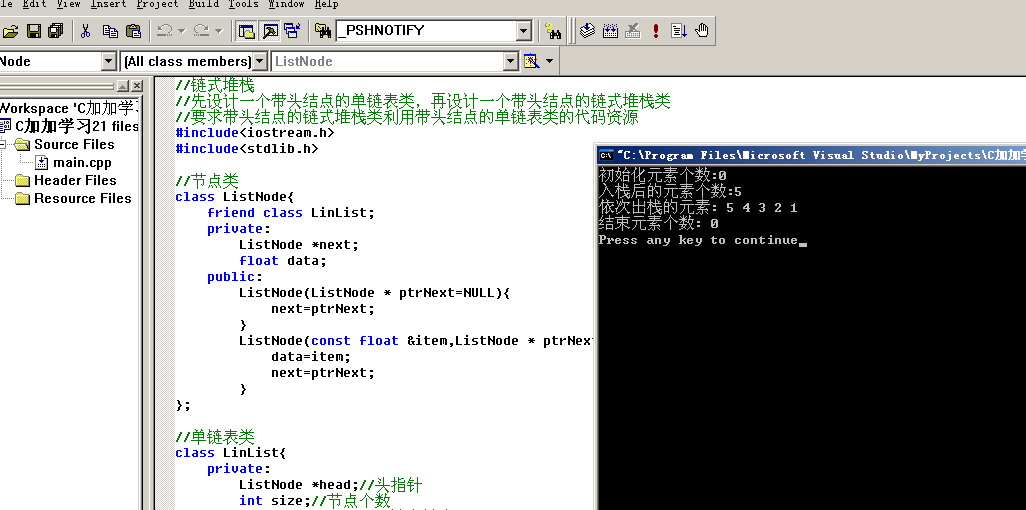1 //链式堆栈 2 //先设计一个带头结点的单链表类,再设计一个带头结点的链式堆栈类 3 //要求带头结点的链式堆栈类利用带头结点的单链表类的代码资源 4 #include<iostream.h> 5 #include<stdlib.h> 6 7 //节点类 8 class ListNode{ 9 friend class LinList; 10 private: 11 ListNode *next; 12 float data; 13 public: 14 ListNode(ListNode * ptrNext=NULL){ 15 next=ptrNext; 16 } 17 ListNode(const float &item,ListNode * ptrNext=NULL){ 18 data=item; 19 next=ptrNext; 20 } 21 }; 22 23 //单链表类 24 class LinList{ 25 private: 26 ListNode *head;//头指针 27 int size;//节点个数 28 void ClearList();//清空链表 29 ListNode * Index(int pos)const;//返回指向第pos个节点的指针 30 public: 31 LinList(); 32 ~LinList(); 33 34 int ListSize()const;//获取节点的个数 35 int ListEmpty()const;//判断链表是否为空 36 void Insert(const float &item,int pos);//插入一个节点 37 float Delete(int pos);//删除一个节点 38 float GetData(int pos)const;//获取第pos个节点的data值 39 }; 40 41 LinList::LinList(){ 42 head=new ListNode;//头指针指向头结点 43 size=0;//初始化节点个数为0 44 } 45 46 LinList::~LinList(){ 47 ClearList(); 48 delete head; 49 } 50 51 //清空链表 52 void LinList::ClearList(){ 53 ListNode *p,*p1; 54 p=head->next; 55 while(p!=NULL){ 56 p1=p; 57 p=p->next; 58 delete p1; 59 } 60 size=0; 61 } 62 63 //返回指向第pos个节点的指针 64 ListNode * LinList::Index(int pos)const{ 65 if(pos<-1 || pos>size ){ 66 cout<<"参数pos越界出错!"<<endl; 67 exit(0); 68 } 69 70 if(pos==-1){ 71 return head; 72 } 73 74 ListNode *p=head->next; 75 int i=0; 76 while(p!=NULL && i<pos){ 77 p=p->next; 78 i++; 79 } 80 return p; 81 } 82 83 //获取节点的个数 84 int LinList::ListSize()const{ 85 return size; 86 } 87 88 //判断链表是否为空 89 //1为空 0不为空 90 int LinList::ListEmpty()const{ 91 if(size<=0){ 92 return 1; 93 } 94 return 0; 95 } 96 97 //插入一个节点 98 void LinList::Insert(const float &item,int pos){ 99 ListNode *p=Index(pos-1); 100 ListNode *newNode=new ListNode(item,p->next); 101 p->next=newNode; 102 size++; 103 } 104 105 //删除一个节点,并且返回这个被删除的节点的值 106 float LinList::Delete(int pos){ 107 if(size==0){ 108 cout<<"链表为空,没有元素可以删除!"<<endl; 109 exit(0); 110 } 111 ListNode *p=Index(pos-1),*q; 112 q=p->next;//q指向第pos个节点 113 p->next=p->next->next; 114 float data=q->data;//获取第pos个节点的data值 115 size--; 116 delete q; 117 return data; 118 } 119 120 //获取第pos个节点的data值 121 float LinList::GetData(int pos)const{ 122 ListNode *p=Index(pos); 123 return p->data; 124 } 125 126 //带头结点的链式堆栈类 127 class LinStack:private LinList{ 128 public: 129 LinStack():LinList(){} 130 ~LinStack(){} 131 132 int StackSize()const{ 133 return ListSize(); 134 } 135 136 int StackEmpty()const{ 137 return ListEmpty(); 138 } 139 140 void Push(const float &item){ 141 Insert(item,0); 142 } 143 144 float Pop(){ 145 return Delete(0); 146 } 147 148 float GetTop()const{ 149 return GetData(0); 150 } 151 152 }; 153 int main(){ 154 LinStack myStack; 155 float i; 156 cout<<"初始化元素个数:"<<myStack.StackSize()<<endl; 157 for(i=1;i<=5;i++){ 158 myStack.Push(i); 159 } 160 161 cout<<"入栈后的元素个数:"<<myStack.StackSize()<<endl; 162 cout<<"依次出栈的元素: "; 163 for(i=1;i<=5;i++){ 164 cout<<myStack.Pop()<<" "; 165 } 166 cout<<endl; 167 cout<<"结束元素个数: "<<myStack.StackSize()<<endl; 168 169 return 0; 170 }
